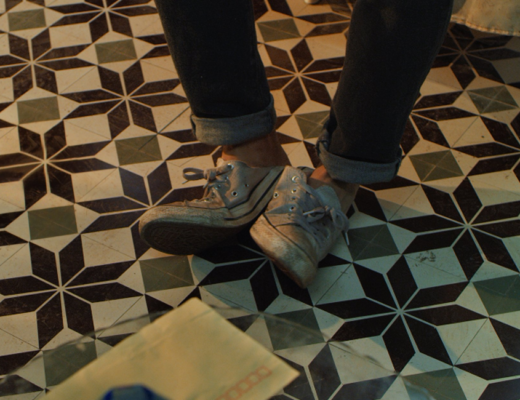Black as Night is a remarkably dull vampire flick riddled with awful centrist politics.
Part of the second wave of Blumhouse castoffs that have been repackaged and dumped onto Amazon Prime streaming (the first batch arrived this time last year), Maritte Lee Go’s Black as Night boasts a bevy of admirable qualities — women of color both in front of and behind the camera, attention paid to the representation and humanity of lower income people, a critique of gentrification, and a staunch defense of darker-skinned Black women as paragons of beauty — all in service of an extremely boring Buffy the Vampire Slayer knock-off. Truly, it’s a sterling example of socially conscious filmmaking failing to translate in any way into an actually good movie. The film begins with voiceover from young high-schooler Shawna (Asjha Cooper), who’s in the midst of a lazy summer hanging out with best friend Pedro (Fabrizio Guido). She’s an introvert, embarrassed by her dark skin and pining over local hunk Chris (Mason Beauchamp). Pedro is the loud, gay BFF, a tired archetype that teeters on the edge of offensive cliché (thankfully, Guido is a talented enough performer to transcend the script’s lapses in judgement). In these early scenes, Go and cinematographer Cybel Martin manage to effectively sketch in the stratified racial and economic milieu of New Orleans; Shawna and Pedro sneak around on the rooftops of luxury French Quarter hotels but go home to their low-income housing, leaving glitz for glum. Shawna frequently visits her mother in the Ombreaux projects, where she’s cloistered herself away from her children while battling a drug addiction. As her father explains, Shawna was born immediately after Hurricane Katrina, and the entire family has been living in the aftermath of the cataclysmic event for 15 years. But before you can say Sundance-approved-social-realist-drama, the film introduces a pack of vampires preying on the poor folks in the Ombreaux. Shawna is attacked by one after leaving a party late one night, but the creature is scared off before it can kill her. Shawna doesn’t understand how she was bitten but not turned, and so begins a long, saggy stretch of narrative wherein she must first convince Pedro that vampires are real, then consult with a local girl named Granya (Abbie Gayle) who fancies herself an expert on the occult. If this sounds familiar, that’s because it is, and scenes of the trio (soon to be a foursome, as Chris gets roped into their makeshift Scooby gang) going over the “rules” of vampirism are dreadfully dull. Granya walks them through all the various iterations of vampire lore, although it’s never made clear why characters who reference both Buffy and Wesley Snipes’ Blade in their dialogue would need a primer on garlic and stakes through the heart.
Concerned for her mother’s safety, Shawna and Pedro try to get her to leave her dingy apartment, but it’s too late. She’s been turned, and Shawna kills her in an act of self-defense. Determined to get vengeance for her mother’s death, Shawna and co. track down a local who they believe to be the head vamp. But nothing changes after they dispatch him, and they must continue hunting for the “big bad.” Here, yet another thread is introduced, as a centuries-old vampire from Africa reveals himself to Shawna and unloads yet another heaping amount of lore and exposition. In this version of vampirism, it turns out, the creatures can learn over time to go without blood, and darker-skinned vamps can even learn to go out into sunlight. To this vampire warrior, Shawna’s dark skin is actually a superpower of sorts (subtext!). Or something like that. It’s truly remarkable how much sitting and talking is packed into Black as Night’s brief runtime, as it oscillates between long stretches of boring exposition and jumbled bursts of poorly-lit action. The set pieces are few and far between, none of them particularly scary or gory, and the big reveal of the actual head vamp lands with a thud. Curiously, for all the film’s progressive bona fides, it gets tangled up in its own mythos and eventually settles on a wishy-washy centrism, suggesting that the best way to fix society’s problems isn’t through radical interventions but carefully playing the game through traditional means. Maybe this is just the first genre film of the Biden era — a whimper in the face of institutional violence that thinks petitions are a better idea than abolishing the filibuster. Ultimately, then, Black as Night is a bad movie that reveals even worse politics.
You can currently stream Maritte Lee Go’s Black as Night on Amazon Prime Video.







